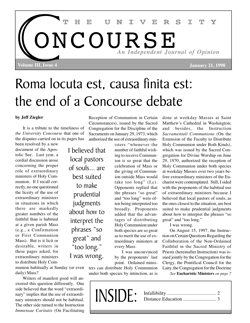The freedom of stricture
by Kathleen van Schaijik
Monday morning I read an internet news story about the pope’s naming 22 new cardinals. With an air of irrepressible dismay, the author noted: “With the new nominations the Pope has named some 88 percent of the ‘cardinal electors.’ This increases the possibility that his successor will be a conservative in his own image who will not change controversial Church teachings”—as if the possibility had ever been otherwise; as if, up until now it was likely that the next pope would have changed Church teachings. Such egregious ignorance of the nature of the papacy and the facts of ecclesial history is too common to be noteworthy in itself, but it does provide fresh opportunity for grateful reflection on one of the mysteries of our faith, which is so impossible for the world to comprehend-namely, the freedom and joy that comes from having an infallible interpreter of religious truth in the world.
That it is an interpreter of truth and not a maker of truth is, of course, the all-important point that the world cannot seem to grasp. A pope has less power to change the teachings of the Church than a meteorologist has to change the weather.
But here I am less concerned with what powers the Church does not have than with one of the powers it does have, viz. the authority to restrict our reasoning, to make declarations about what is and what is not consistent with Revelation and conducive to sanctity, and occasionally to put a definitive stop to our deliberations. This, too, is cause for alarm in the world, which cannot help but assume that the limits the Church puts on Reason must cripple and demoralize Catholic minds. But the truth is, as Newman put it so perfectly in the Apologia, that “The energy of the human intellect ‘does from opposition grow;’ it thrives and is joyous, with a tough elastic strength, under the terrible blows of the divinely fashioned weapon [of Infallibility], and is never so much itself as when it has lately been overthrown.”
It is not only a truth of our Faith that the limits of Church teaching are good for us; it is a fact of our experience. We are not depressed, but enlivened and rejoiced over the authoritative pronouncements issuing from the Vatican, even when they mean we have to change our own opinions. A modest instance of it can be seen in this issue of the Concourse. There is a sense of gladness in Jeff Ziegler’s unhesitating admission that he was wrong about the use of extraordinary ministers.
This is because declarations of the Church have less the effect of a narrowing of the range of our thinking than proving to us that our thinking was too narrow to comprehend the whole truth of the matter; that there was an aspect we hadn’t considered, a richness we hadn’t recognized, a depth we hadn’t plumbed. In other words, there is more to the whole question than we knew; more wisdom to be learned, more blessing to be received.
If it is true, as the document cited by Mr. Ziegler seems to indicate, that some of our liturgical practices have had the unintended effect of undermining our ability to realize the greatness and dignity of lay vocations, then what it chiefly means practically is that changing those practices will result in a deeper understanding and appreciation of that mystery. A clear and simple means of appropriating more of the truth has been put into our hands. Thus, we have reason to rejoice, whatever side of the debate we might previously have favored.
All this is of course not to say that such debates are pointless. On the contrary, it is in part by observing the efforts of the faithful to understand and live by her teachings that enables the Church to penetrate truth more deeply and to proclaim it more confidently and clearly for the good of the whole body.
Therefore, though one of our cases might be closed, let’s not stop deliberating till the others are too.
Kathleen van Schaijik


